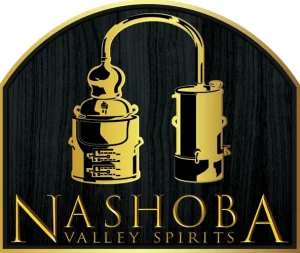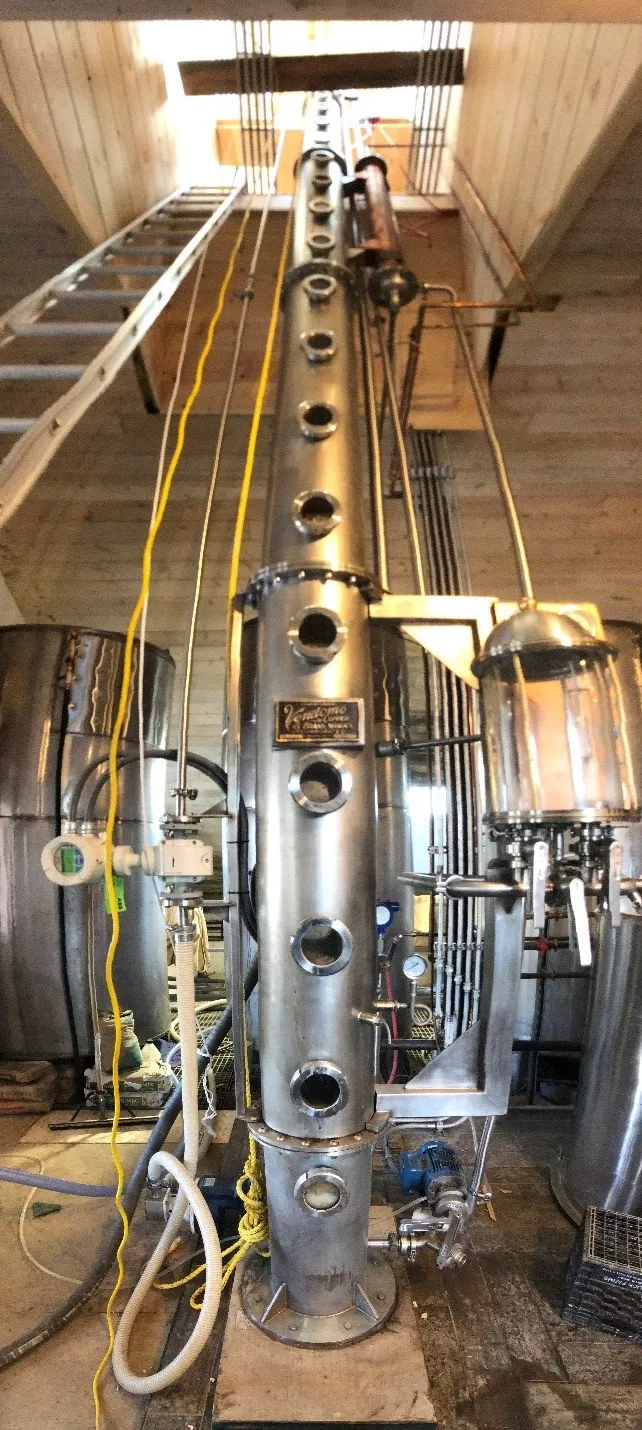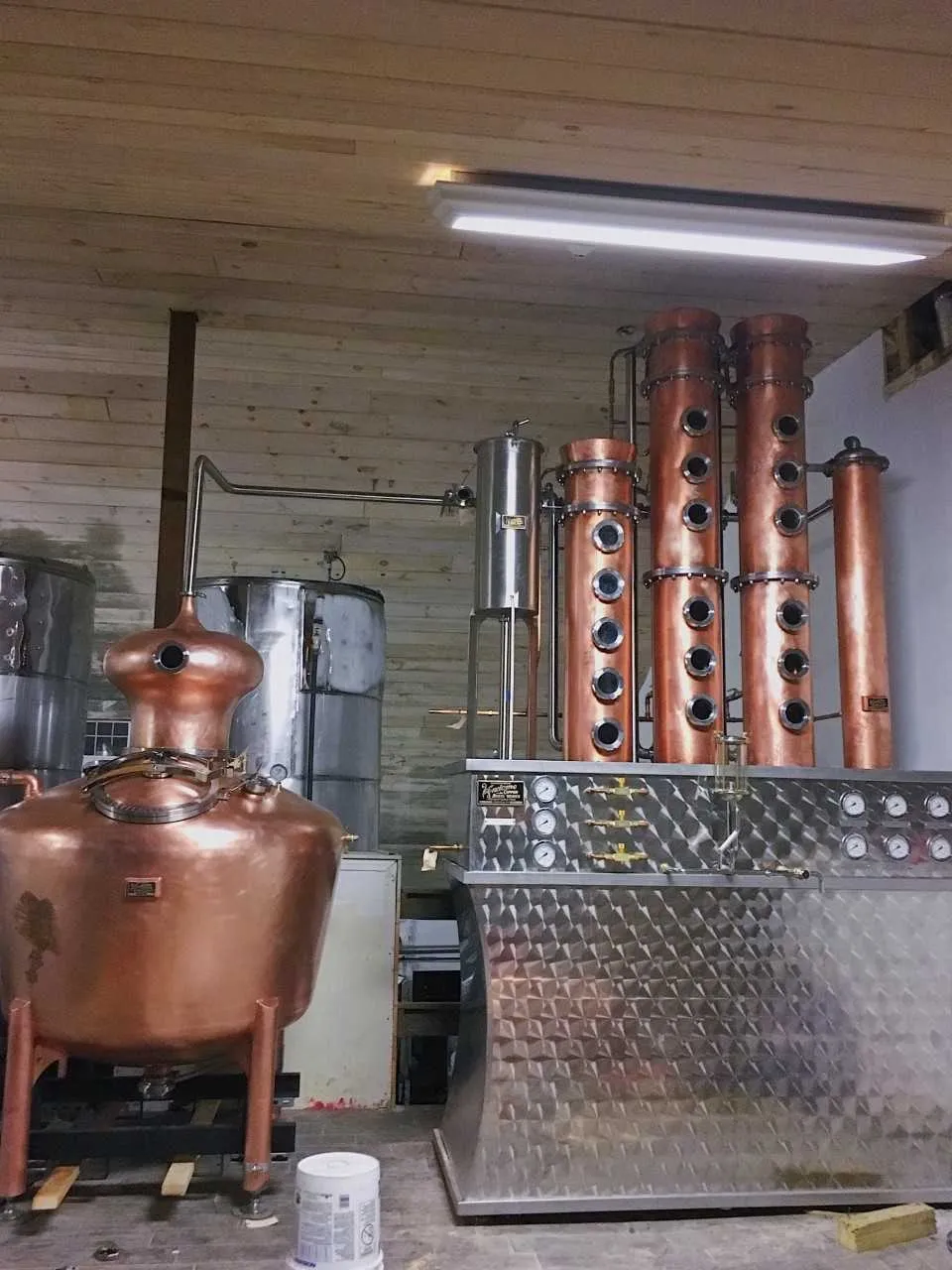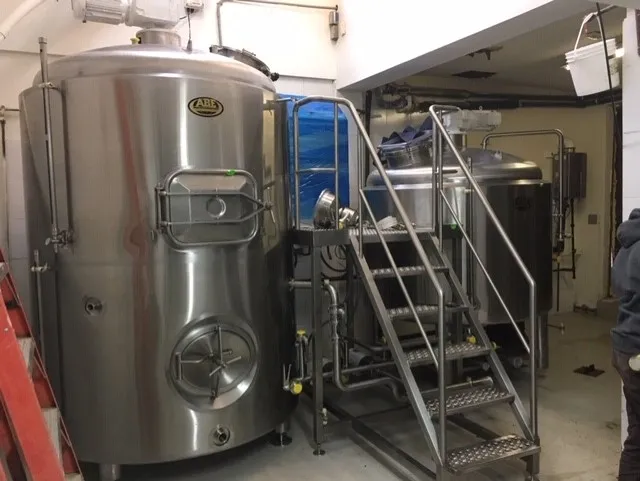Sanitizer
Aeronaut, Wormtown, Strange Brew, Trillium & Iron Duke
At their own initiative, Aeronaut, Wormtown, Strange Brew, Trillium and Iron Duke reached out and started contributing beer to the project which we then distill into sanitizer. Effort spearheaded by Ben Roesch of Wormtown and Julia Piper of Aeronaut. Thanks for your help. United We Stand
- Production
- Process
- In Use
Twenty Six Feet of Hot Air
It was just about a month ago when we found a local Facebook post talking about the aesthetics of the new cupola on the winery roof and its purpose. At the time, no one realized how important the structure would become. The speculation about its need, size and architectural design found some amusement with our staff who knew it was functionally necessary but not necessarily an architectural masterpiece . Inside the off centered tall cupola is a 28’ tall continuous column still that was installed last year and is now being used almost exclusively to produce hand sanitizer. One day we were mastering the art of making hand crafted bourbon, whiskey and apple brandy in our new facility and almost instantaneously transitioning to a pure production facility fermenting sugar as quickly as possible and distilling it as quickly as possible into Liquid Hand Sanitizer. To say that it was difficult would be an understatement as we were challenged at every step of the transition. Flavor profiles got thrown out the window as everything became about speeding up the process. After 21 straight days, Nashoba became a factory of hand crafted sanitizer focused on contributing to the health of our community. Three weeks into this unforeseen journey, Nashoba Valley Distillery surpassed its goal of producing a thousand gallons of hand sanitizer, most made from fermented sugar cane, but a lot from contributions of beer from local breweries. At their own initiative, Aeronaut, Wormtown, Strange Brew, Trillium and Iron Duke reached out and started contributing beer to the project which we then distill into sanitizer. It is unbelievable that all of these breweries reached out to us directly or through an effort spearheaded by Ben Roesch of Wormtown and Julia Piper of Aeronaut. No one has asked for anything in return with their sole objective to share in our costs and assist us in producing as much sanitizer as possible for a little as possible. While beer takes a little more time to distill because of its lower alcohol, we have been able to focus our efforts solely on the distillation process rather than the combined process of fermenting sugar and distilling. It takes specialized equipment to turn 6 % beer into 95% ethanol as well as a lot of time, propane, and cooling water. When does the story end. Hopefully very soon but we remain committed to sanitizing a million hands per week for as long as it is necessary. Crafted One Hand At A Time.
Bread, beer, and Wine - Most of us love some or all of these! But they would not exist if not for yeast, a microorganism that can metabolize sugars anaerobically through a pathway called alcohol fermentation. Humans have been using yeasts to make these products for thousands of years, but only learned of their existence in the last two hundred years. How exactly do these tiny creatures make these delicious drink items? Alcohol fermentation, also known as ethanol fermentation, is the anaerobic pathway carried out by yeasts in which simple sugars are converted to ethanol and carbon dioxide. So almost anything with sugar, fruit, sugar cane, milk, dandelions, or starch converted to sugar can be fermented and can create alcohol to various levels. (grandmother used to make dandelion wine - Never became popular but our lawns look nice) When we started the journey into making sanitizer, we purchased 30,000 lbs of cane sugar as it is the least expensive and most readily available product to quickly ferment. Our brewery consists of a 16-barrel kettle and mash tun (496 gallons each) which we purchased in 2019. Modified to have mixing paddles in both the mash tun and the kettle, the design facilitates the production of whiskey and bourbon mashes and now sugar mashes. Our kettle and our mash tun are both fitted with rakes and paddles for low temperature conversion. This has proven to be extremely helpful in the mixing of 1400 lbs. of cane sugar per batch in each kettle allowing us to mix about 32 barrels (1000 gallons) in a three hour process. Mixed in at 130 degrees, cooled to 95 degrees, pitched with turbo yeast, fermented at 95-96 degrees in 48 to 60 hours to 13-15% ABV.
Distilling
Once we have alcohol, we then need to separate the alcohol from basically the water in our fermented mixture. A continuous column still is almost magical as our column has 20 perforated plates which distills about 3 gallons of 15% fermented cane sugar per minute into about 1/2 gallon of Distilled spirits at 65% ABV (Alcohol by Volume). The beer to be distilled is pumped in near the top of the column (but not at the very top), and steam is pumped up from the bottom of the column. While the plates are perforated, this lets the steam come up through the still, but the beer does not drip down through these holes. Rather, the beer runs across each plate to the other side, flows down to the next plate and flow across it to the other side. The steam coming up through the column vaporizes the alcohol from the beer (which then flows to the top of the column), while leaving the water to keep dripping down to the bottom. (As in every still, it is tuned so that the alcohol that has a lower boiling temperature evaporates off, leaving the water with its lower boiling point behind.) It's an incredible piece of equipment and after watching it run for about a year, we still sit there and wonder who invented this miracle.
Remember that sanitizer should be at least 70 to 75% ABV to kill viruses so our 65% alcohol produced above is not of sufficient strength to market as sanitizer. In fact, the guidelines that we are working under make us distill to 94.8 % alcohol for purity and then we dilute it back down to 81% ethanol with the addition of reverse osmosis boiled water. So the alcohol produced in the continuous column still is put into a 250 gallon pot still. The alcohol is once again vaporized in the kettle and then another 18 times in each of the trays that it needs to pass through in order for it to get to the chilling column. The vapor(spirits) is then chilled and returned to its liquid state as 95% ethanol. 250 gallons of 65% alcohol from our continuous column then becomes about 145 gallons of 95% alcohol. In our typical 8 hour period with both stills operating, we start with about 1000 gallons of 15% Fermented Cane Sugar going through our continuous column to make 205 gallons of 65% distilled spirits while at the same time working on the previous day column production in our pot still where the 205 gallons of 65% distilled spirits will become 128 gallons of 95% Spirits.
Blending
So now we have 95% ethanol which will kill most anything, About 237 percent stronger than the normal vodka purchased in a store. However, since the goal is to create sanitizer, unsafe for human consumption but safe and effective for killing viruses, we add hydrogen peroxide, glycerol and pure Reverse Osmosis boiled water to our distillate to make a product that has a finished ethanol reading of 81%. The sanitizer is liquid, not gel, so it is going to have a consistency of water but with the glycerol
Bottling
Immediately following the blending, product is bottled and held for 72 hours prior to being made available to end users.
Sanitizer in Action this Month
Over 2500 individual 4 ounce Bottles that have been sold or given to our customers and supporters of our Family Farm. We are working with C. S. Energy to provide #ThankYouHealthHeroes and The Kindness Coalition of Massachusetts https://www.kindnesscoalitionma.org/ with 3000 bottles of sanitizer for their Coronavirus kits that will go to hospital workers and first responders in Central Massachusetts. Each kit includes KN95 masks, Surgical Masks, Isolation gowns, Antibacterial wipes, Water, snacks and hand sanitizer produced and bottled by our distillery from beer provided by Aeronaut, Wormtown, Strange Brew, Trillium & Iron Duke.
We have also provided sanitizer to the following Hospitals, Non-Profits and Essential Businesses.
Alpha Analytical, Axis New England, Bain Pest Control, Bolton Country Cupboard, Bolton Orchards, C. S. Energy Carewell Urgent Care CASPAR Homeless Shelters Century Homecare, LLC. Chiropractic Center Coghlin Companies Corporate Environmental Solutions Crescent Manor Rest Home CSX CORPORATION Department of Developmental Services/Metro Residential Services Emerson Physician-Hospital Organization, Inc. Family Health Center Worcester Homeless Outreach and Advocacy Program First Light Power Flaherty Physical Therapy Gannett Publishing - WickedLocal H.R. Prescott & Sons Harbro Auto Sales & Service Harvard Vanguard - Chelmsford Harvard Vanguard Medical Associates Hearthstone Alzheimer Care Il Camino Restaurant, Inc. Independent Truck Services, Inc Joe Welch Plumbing John A. Buttaro, Inc. D Karen Griffin Krohne, Inc Lancaster Fire/EMS Lilac Hedge Farm Lockwood Remediation Technologies, LLC Longden Company, Inc. LUK Crisis Center, Inc. M.A. Restoration, Inc Main Street Bank Maki Building Centers Maxim Healthcare Services, Inc. Moppets Mosquito Squad Mountain View Farms, LLC Mr. Trashman Nashoba Family Dentists Nashoba Park Assisted Living New Beginnings Homecare New Communities Services North Country Eye Care Northern Drill Services, Inc Percy Law Group, LLC Power Options R. F. W. Ford Construction Remax Executive Realty River Terrace Rotary Volunteer/ WHEAT Meals Delivery to Elderly` S & S Marketplace Saint-Gobain Performance Ceramics and Refractories Smith's Country Cheese South Middlesex Opportunity Council Spectrum Health Strem Chemicals, Inc Sullivan Drilling Tanya White,R.N The Gables of Fitchburg, Ltd - Assisted Living The Veron Company Thrive Support and Advocacy USPS - Acton Value Electric W. S. Aiken Roofing Welch Brothers Plumbing and Heating



